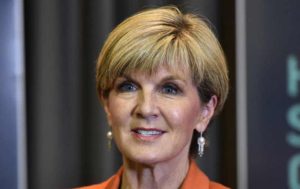Australia appointed to UN human rights body
Australia has secured a seat on the United Nations Human Rights Council despite criticism over its treatment asylum seekers including holding them in detention on Manus Island and Nauru.
Foreign Minister Julie Bishop says Australia will use its new standing to push for the empowerment of women, indigenous rights and abolition of the death penalty.
It will also try to address the crises in North Korea and Syria and push for reform of the controversial body, Ms Bishop said.

Julie Bishop
Australia was elected unopposed to the council joining Spain as a ‘Western European and other States’ representative for a three-year term and replacing the Netherlands and Portugal.
Angola, Congo, Senegal, Slovakia, Ukraine, Chile, Mexico, Peru, Afghanistan, Nepal, Pakistan, and Spain were also elected to the council, while Nigeria and Qatar won second terms.
“Australia will bring a very principled and pragmatic approach,” Ms Bishop said.
“We put in a very strong campaign and received a lot of written pledges for our offer to serve on the Human Rights Council campaign,” she said.
“We had five themes in relation to gender empowerment and freedom of speech and strengthening democratic institutions and human rights institutions and Indigenous rights and the like,” Ms Bishop said.
The announcement comes as a United Nations committee will examine Australia’s human rights record.
“We will continue to be an open, transparent, accountable country committed to the rule of law and human rights,” Ms Bishop said.
“Australia is open to being investigated and open to views from outside, but that doesn’t mean that we shouldn’t rightfully take our place on the human rights council,” she said.
An expert committee will grill the Australian government on its human rights record, including on indigenous affairs and asylum seeker policies, as Australia prepares to join the powerful UN body.
A coalition of non-government organisations is expected to appear before the UN Human Rights Committee in Geneva on Monday to report on Australia’s compliance with the International Covenant on Civil and Political Rights, ahead of government officials who appear on Wednesday and Thursday.
“During Australia’s last review, in 2009, committee members raised concerns about the Australian government’s policies on Aboriginal and Torres Strait Islander peoples’ rights, its cruel treatment of people seeking asylum, its use of national security laws to erode basic civil liberties, and police information-sharing practices on cases that involved the death penalty overseas,” the Human Rights Law Centre (HRLC) said in a statement.
“Australia was once considered a world leader when it came to promoting some of the key rights that underpin successful democracy – access to voting, the right to peacefully protest and for workers to stand together in union,” the HRLC said.
The appointment also comes as refugees from the Manus Island detention centre in Papua New Guinea have been offered an opportunity to move to Nauru ahead of the planned closure of the Manus Island centre at the end of this month.
A four-year wait is over for the first of the refugees leaving Papua New Guinea’s Manus Island and the island of Nauru, with a group on its way to the US under a deal struck with then-US president Barack Obama in late 2016.
Laurie Nowell
AMES Australia Senior Journalist












